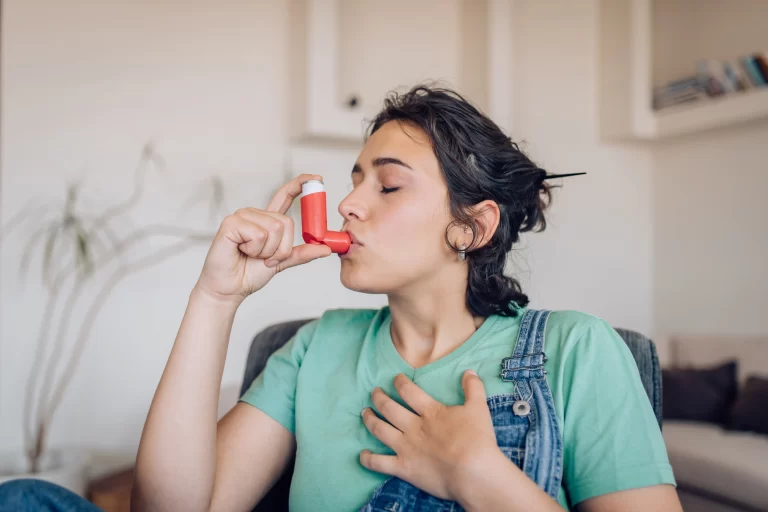Asthma is a chronic respiratory condition. It affects the airways, which transport air to and from the lungs. It is a major Noncommunicable Disease (NCD) affecting children and adults. About 27 million people in the United States, roughly 1 in 12, have Asthma. Managing this lung condition involves avoiding triggers, taking prescribed medications, and monitoring symptoms to prevent severe attacks. Read this informative article to learn more about Asthma symptoms in adults.
Common symptoms of Asthma in adults
The common Asthma symptoms in adults vary and can be of different intensities, ranging from mild to severe, and can typically be managed with medications like Aerocort Forte Rotacaps 200/100mcg. The following are some of the symptoms of Asthma, which some may experience intermittently and some may experience persistently.
Wheezing
A classic symptom of Asthma is a high-pitched whistling or squeaky sound during breathing, especially when exhaling. Wheezing occurs due to the narrowing and inflammation of the airways, making breathing in and out challenging.
Every adult with Asthma does not experience wheezing, but for anyone who gasps, it’s an indication of the narrowing or obstruction of the airways. This causes noisy and labored breathing. The volume of wheezing can be faintly audible or noticeable.
Coughing
Persistent, recurrent coughing is common, especially at night, during exercise, when exposed to cold air, or when laughing. The cough may be dry and nonproductive, causing discomfort and disrupting sleep.
Shortness of breath
Experiencing trouble taking deep breaths is a common sign of Asthma. Breathlessness in adults can hinder activities like climbing stairs or walking even short distances.
Physical exertion and exposure to allergens can trigger this symptom, which feels like an inability to get enough air or gasping to breathe. But it can also happen while at rest.
Chest tightness
Adults with Asthma often describe a feeling of tightness, pressure, or chest pain that can make breathing uncomfortable and limit physical activity. Tightness in the chest, like there’s a band around it, can be distressing and may make an affected individual anxious. The feeling of a heavy weight pressing down the chest can make taking deep breaths difficult.
Tachypnea
Rapid breathing, medically termed ‘Tachypnea,’ is another Asthma symptom in adults. An individual may breathe shallowly and quickly and with visible effort, too.
What triggers Asthma symptoms in adults
The following factors can trigger Asthma symptoms in adults, causing Asthma attacks or making them worse.
- Airborne irritants: Chemical fumes, pollution, smoke, and strong odors can trigger Asthma symptoms by irritating the airways
- Allergens: Dust mites, pet dander, pollen, mold, and other allergens can trigger Asthma symptoms in adults
- Exercise: Physical activity, especially in cold or dry air, can induce Asthma symptoms in some adults. This is known as exercise-induced bronchoconstriction
- Emotions and stress: Intense emotions or emotional stress can kick off Asthma symptoms and lead to hyperventilation or shallow breathing
- Medications: Some medications can trigger Asthma symptoms in sensitive individuals. E.g.- Non-steroidal Anti-inflammatory Drugs (NSAIDs) and beta-blockers
- Weather conditions: Weather change, cold air, and humidity can affect Asthma symptoms, causing them to flare up
Diagnosis of Asthma in adults
To diagnose Asthma in adults, a doctor typically carries out a thorough medical history and physical examination and suggests or conducts one or more diagnostic tests, specifically lung function tests.
The first step typically involves spirometry, a test to measure airflow and assess how well one can inhale and exhale. If airflow obstruction is seen, an individual has to take a bronchodilator reversibility testing is performed to see if the lung function improves after inhaling a medication.
Additional tests may also be necessary, such as measuring exhaled nitric oxide to look for airway inflammation and using a peak flow meter to evaluate peak expiratory flow variability. If initial tests are inconclusive, bronchial challenge testing might be done.
Tips to manage Asthma symptoms in adults
Though Asthma is incurable, there are appropriate treatments and other strategies that can effectively manage the symptoms.
- Medication: Inhaled corticosteroids, bronchodilators, and other medications can help manage Asthma symptoms and prevent attacks. Aerocort Forte Rotacaps 200/100mcg is one such effective and affordable medication
- Avoiding triggers: An individual can decrease the severity and intensity of Asthma attacks by recognizing and avoiding triggers
- Controlling the environment: Measures such as air purifiers, allergen covers, and regular cleaning can lessen exposure to allergens and irritants
- Regular check-ups: Regular doctor visits are important for monitoring Asthma symptoms, adjusting medications as needed, and receiving guidance on Asthma management
Conclusion
Knowledge about Asthma symptoms in adults, like chest tightness, coughing, rapid breathing, shortness of breath, and wheezing, is crucial for detecting them. Identifying signs of Asthma helps manage the condition and seek treatment at the right time. It is also important to know about triggers like airborne irritants, allergens, and stress, which can set off Asthma attacks. You should not delay a doctor consultation if experiencing Asthma symptoms. With proper monitoring and treatment, it is possible to lead a regular and usual life despite Asthma.


Comments are closed.